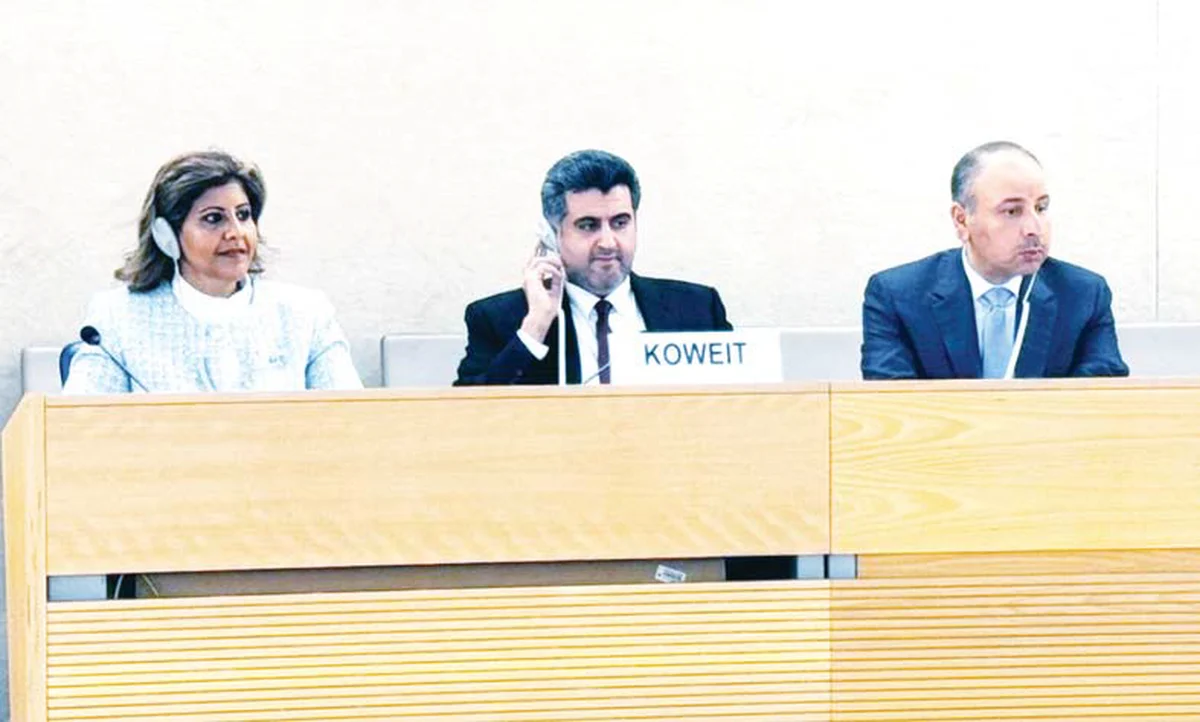10/05/2025
10/05/2025

GENEVA, May 10: The United Nations Human Rights Council (UNHRC) unanimously adopted Kuwait's fourth national report, affirming the country's commitment to enhancing its human rights framework. The report underscores Kuwait's dedication to strengthening its national human rights protection system through comprehensive legislative, institutional, and field reforms.
Minister of Justice Counselor Nasser Al-Sumait led the Kuwaiti delegation during the session held in Geneva, presenting the national report within the framework of the UNHRC's Universal Periodic Review (UPR) mechanism.
Key legislative and institutional reforms
Kuwait highlighted several significant reforms aimed at aligning its legal framework with international human rights standards. These include:
- Protection from domestic violence: The enactment of the Law on Protection from Domestic Violence, establishing shelters and hotlines for victims.
- Amendments to Penal Code: Redefining the crime of torture under the Committee against Torture's recommendations.
- Nationality Law Reforms: Amendments to the Nationality Law to align it with civil, economic, and social rights.n
- Abolition of Article 153: Supporting gender equality by repealing provisions that previously allowed lenient sentences for honor-based crimes.
- Raising the Minimum Age of Marriage: Increasing the legal age of marriage to 18 years.
- Abolition of Article 182: Removing exemptions from punishment for perpetrators of kidnapping who marry the victim.
Institutional developments
Kuwait has established several institutions to bolster human rights protections, including:
- Domestic Violence Centers: Providing support services to victims.
- National Office for Child Protection: Focusing on safeguarding children's rights.
- Women's Affairs and Business Committee: Enhancing the role of women in development.
- Specialized Public Prosecution Offices: Addressing human trafficking and human rights violations.
Additionally, Kuwait launched child protection centers in July 2024 to address cases of abuse and neglect.
Advancements in gender equality
Kuwaiti women play a pivotal role in the nation's development, representing 58% of the total national workforce. Women's participation in the government sector stands at 60%, with 48% in both the private sector and the legal profession. Notably, women currently hold three ministerial portfolios in the government.
Support for persons with disabilities
Kuwait allocated approximately $340 million for the fiscal year 2023/2024 to support services for persons with disabilities. This funding benefits over 213,000 individuals across 82 educational and rehabilitation institutions, including schools, nurseries, and treatment centers.
Anti-corruption measures
The report highlights Kuwait's efforts to combat corruption through the preparation of new draft laws aimed at expanding the powers of the Anti-Corruption Authority, strengthening the role and independence of the judiciary, and tightening the protection of public funds in accordance with the United Nations Convention against Transnational Organized Crime.
Digital transformation and environmental initiatives
Kuwait has embraced digitization with the launch of the "Sahel" app, which has processed over 60 million e-transactions. The country has also adopted national strategies to reduce carbon emissions and protect the environment.
International humanitarian efforts
The report underscores Kuwait's role as a capital of humanitarian action, emphasizing its continued commitment to providing large-scale humanitarian aid through the Kuwait Fund for Arab Economic Development. The country supports relief efforts in conflict and disaster areas, particularly in Gaza, Syria, and Yemen, and has organized and hosted international donor conferences.
Commitment to reform and sustainable development
Under the leadership of His Highness the Amir Sheikh Mishal Al-Ahmad Al-Jaber Al-Sabah and His Highness the Crown Prince Sheikh Sabah Khaled Al-Hamad Al-Sabah, Kuwait continues its commitment to reform, modernization, and the promotion of rights and freedoms. These developments reflect the State of Kuwait's renewed commitment to advancing the human rights system based on the principles of the Constitution and international conventions aimed at achieving comprehensive and sustainable development.
Engagement with UN Human Rights mechanisms
The report notes that Kuwait received 302 recommendations in the previous UPR cycle, of which 230 were fully accepted, 6 were partially accepted, and 12 were taken into account. The state remains committed to transparency and openness, fully participating in dialogue sessions with relevant international treaty committees. Kuwait has also engaged with mandate holders and special procedures of the Council, responding to requests for field and scientific visits during 2023 and 2024, including mandates in the fields of development, violence against women, and the rights of persons with disabilities and migrants.
The national report, covering the period from 2020 to the end of 2024, was prepared through a comprehensive participatory methodology involving government agencies, civil society, and the National Bureau for Human Rights. The Kuwaiti delegation pledged to study the 290 recommendations submitted by member states of the United Nations Human Rights Council, focusing on strengthening human rights mechanisms


